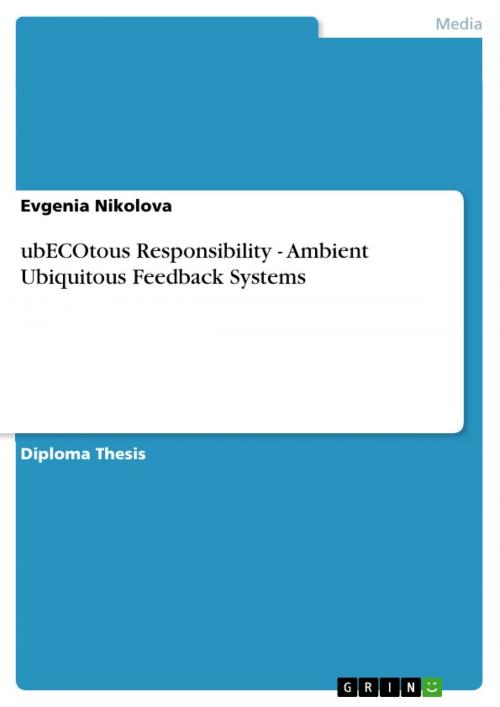ubECOtous Responsibility - Ambient Ubiquitous Feedback Systems
Ambient Ubiquitous Feedback Systems
Nonfiction, Computers, Application Software, Multimedia| Author: | Evgenia Nikolova | ISBN: | 9783638030373 |
| Publisher: | GRIN Publishing | Publication: | April 1, 2008 |
| Imprint: | GRIN Publishing | Language: | English |
| Author: | Evgenia Nikolova |
| ISBN: | 9783638030373 |
| Publisher: | GRIN Publishing |
| Publication: | April 1, 2008 |
| Imprint: | GRIN Publishing |
| Language: | English |
Diploma Thesis from the year 2008 in the subject Communications - Multimedia, Internet, New Technologies, grade: 2,00, University Lübeck, 78 entries in the bibliography, language: English, abstract: This thesis deals with a broad spectrum of topics and scientific areas, such as environmental studies, ecology, health research, sustainability, psychology, technology, and design, among others. It presents a feasability study with recommendations, addressing both technical and design issues, for ubiquitous feedback systems, including an in-depth analysis of building blocks for such systems. The theory encouraging the creation of systems for displaying real-time resource consumption is that such systems are effective at reducing resource consumption and stimulating the interest of building occupants. Personal and institutional choices have the potential to substantially reduce resource use in buildings. However, it may be difficult to motivate inhabitants to make decisions that conserve resources for future generations if they cannot easily and immediately observe the consequences of these decisions. Feedback on resource use has the potential to increase both awareness and motivation to act in ways that minimize resource use. The goal of this thesis is to present an in-depth research of a variety of options for a data monitoring and display system that enables easy observation and interpretation of electricity, water, gas, and oil use within buildings, since the built environment is responsible for a large portion of the overall energy consumption. The beginning of the thesis will focus on the rationale for developing systems for displaying data on resource use to building users. Then, the technical aspects of developing, designing, and testing data monitoring and display systems will be discussed. Besides, the social implications of installing such systems and the behavioral-psychological issues involved in occupants' behavior in relation to the feedback will be investigated.
Diploma Thesis from the year 2008 in the subject Communications - Multimedia, Internet, New Technologies, grade: 2,00, University Lübeck, 78 entries in the bibliography, language: English, abstract: This thesis deals with a broad spectrum of topics and scientific areas, such as environmental studies, ecology, health research, sustainability, psychology, technology, and design, among others. It presents a feasability study with recommendations, addressing both technical and design issues, for ubiquitous feedback systems, including an in-depth analysis of building blocks for such systems. The theory encouraging the creation of systems for displaying real-time resource consumption is that such systems are effective at reducing resource consumption and stimulating the interest of building occupants. Personal and institutional choices have the potential to substantially reduce resource use in buildings. However, it may be difficult to motivate inhabitants to make decisions that conserve resources for future generations if they cannot easily and immediately observe the consequences of these decisions. Feedback on resource use has the potential to increase both awareness and motivation to act in ways that minimize resource use. The goal of this thesis is to present an in-depth research of a variety of options for a data monitoring and display system that enables easy observation and interpretation of electricity, water, gas, and oil use within buildings, since the built environment is responsible for a large portion of the overall energy consumption. The beginning of the thesis will focus on the rationale for developing systems for displaying data on resource use to building users. Then, the technical aspects of developing, designing, and testing data monitoring and display systems will be discussed. Besides, the social implications of installing such systems and the behavioral-psychological issues involved in occupants' behavior in relation to the feedback will be investigated.















